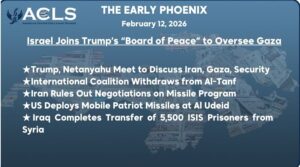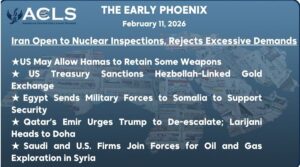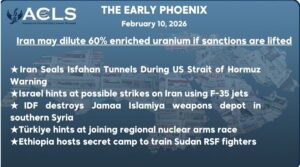TV7 Israel – Deep Dive Featuring Hudson Institute – Israel At War Update – November 25th, 2024
Introduction
The recent episode of TV7 Israel – Deep Dive Featuring Hudson Institute, hosted by Jonathan Hassan, brought together two eminent voices: Dr. Michael Doran, Director of the Center for Peace and Security in the Middle East at the Hudson Institute and former National Security Council member, and Major General (Reserve) Gilead Aquin, a former commander in the Israeli Defense Forces and head of Israel’s Defense Colleges. This discussion explored Iran’s regional strategies, the interplay of proxies, and the ideological underpinnings driving its ambitions, culminating in an incisive examination of Israel’s military and diplomatic calculus.
Dr. Doran opened the discussion by outlining the broad geopolitical landscape, particularly the implications of Donald Trump’s return to the U.S. presidency. Jonathan Hassan followed with a detailed analysis of Iran’s proxy networks in Syria and beyond, while Major General Aquin provided a deeper philosophical exploration of Iran’s Jihadist ideology and its strategic calculations. The discussion concluded with reflections on Israel’s military priorities and the necessity for U.S.-Israel alignment against Iran.
Setting the Stage: Dr. Michael Doran on the Geopolitical Shift
Dr. Doran began by highlighting the arrival of Donald Trump and its implications for the Middle East. He noted Trump’s instinctive pro-Israel and anti-Iran stance, contrasting sharply with the Biden administration’s approach. Doran predicted that Trump’s policy would center on economic pressure, though the military dimension remained unclear. He speculated that Iran, anticipating tougher policies, might initiate a “whispering campaign,” presenting itself as a willing negotiator to buy time. Drawing on his White House experience, Doran recounted how Iran effectively employed such tactics in 2006 during efforts to refer its nuclear file to the UN Security Council. He warned that Iran, weakened by Israeli strikes on its air defenses and vulnerable to further attacks, might adopt similar methods to stall U.S. action under Trump.
Jonathan Hassan: Iran’s Proxy Networks and Regional Expansion
Jonathan Hassan followed by delving into the operational and logistical tactics underpinning Iran’s regional strategy. He detailed how Iran utilizes proxies in Syria, particularly in the border town of Abu Kamal, as critical nodes for smuggling weaponry and illicit materials. Iranian-backed Afghan militias (Liwa Fatemiyoun) and Pakistani units (Liwa Zainabiyoun) play pivotal roles in these operations, facilitating the transfer of arms through Jordan and into Israel via networks involving the Muslim Brotherhood’s criminal syndicates. These operations sustain Hamas and Palestinian Islamic Jihad, exacerbating instability and amplifying Iran’s regional influence.
Hassan underscored the role of Qassem Soleimani in devising these networks, describing how his vision of asymmetric warfare orchestrated through proxies allowed Iran to expand its influence while maintaining plausible deniability. Soleimani’s strategies also emphasized creating ideological and logistical alignments among disparate groups, building a cohesive “ring of fire” around Israel.
Hassan highlighted that Israel’s Operation Waves Breaker, designed to dismantle these networks in Northern Samaria, was a significant tactical success. However, this pressure on Hamas precipitated the October 7th attack—a desperate yet calculated attempt by Hamas to redirect Israeli military focus. Iran, seeking to capitalize on this turmoil, authorized Hezbollah to engage, effectively dividing Israel’s military forces across multiple fronts.
Major General Gilead Aquin: Iran’s Ideological Strategy and Long-Term Vision
Following Hassan’s analysis, Major General Gilead Aquin expanded on the ideological underpinnings driving Iran’s regional ambitions. He emphasized that Qassem Soleimani’s “ring of fire” was not merely a military construct but a manifestation of Iran’s deeper ideological commitment to perpetual Jihad. Aquin explained that Iran views conflict as open-ended, rejecting conventional Western notions of victory or resolution. For Iran, each fallen fighter is likened to an olive tree, whose sacrifice nurtures the growth of future generations of Jihadists.
He further detailed how Iran’s leaders have embraced radical philosophical critiques of Western Enlightenment principles, particularly those of Heidegger, to construct an alternative framework of rationality. This ideological foundation prioritizes technological and scientific advancements without accepting the universal humanist values associated with Enlightenment thought. Aquin stressed that this approach allows Iran to sustain its ideological war against Israel and the West, shaping a narrative that galvanizes its proxies and strengthens its long-term strategic vision.
Aquin concluded by noting that while Israel has achieved significant tactical victories against Iran’s proxies, these gains must be understood within the broader context of Iran’s enduring ideological commitment to its revolutionary goals.
Dr. Michael Doran: The Broader Conflict and U.S. Strategic Missteps
Dr. Michael Doran followed by contextualizing Iran’s actions within a broader ideological and geopolitical framework. He argued that Iran’s campaign against Israel is not an isolated conflict but part of a larger struggle against Western civilization as a whole. Doran explained that in Iran’s worldview, Israel is more than a territorial adversary—it represents an outpost of Western influence and a profound affront to Islamic identity. This ideological framing amplifies the significance of Iran’s “resistance axis,” uniting proxies across the region against a common enemy.
Doran critiqued the U.S. for misinterpreting the scope of the conflict, particularly under the Biden administration. He highlighted how Washington’s focus on framing the crisis as an Israeli-Palestinian issue fails to address Iran’s central role in orchestrating regional hostilities. This narrow view, he argued, inadvertently bolsters Iran’s position, as it allows Tehran to frame its actions as defensive and legitimate in the face of perceived Western aggression.
He further noted Iran’s unprecedented success in aligning its resistance axis with the global ceasefire movement, a diplomatic maneuver that enhances its narrative while constraining Israel’s actions. By negotiating ceasefires on Iran’s terms, the U.S. risks reinforcing Tehran’s strategy rather than countering it. Doran urged a reorientation of U.S. policy to recognize the interconnected nature of Iran’s regional ambitions and to prioritize dismantling Tehran’s influence across multiple fronts.
Jonathan Hassan: Hezbollah’s Tactics and Ceasefire Dynamics
Jonathan Hassan pivoted the discussion to focus on Hezbollah and the ongoing negotiations concerning a potential ceasefire on the Lebanese front. He described Hezbollah as a central pillar of Iran’s “ring of fire,” armed with precision missiles, drones, and a strategic foothold in Lebanon. Despite Israel’s military successes against Hamas and other proxies, Hassan noted that Hezbollah retains significant offensive capabilities, particularly from positions north of the Litani River and the Bekaa Valley.
Hassan explained that Iran is signaling a willingness to support a ceasefire in Lebanon, not as a concession but as a calculated move to preserve Hezbollah’s strength for future conflicts. He emphasized the risks of entering into such an agreement, as Hezbollah views ceasefires as tactical pauses rather than long-term resolutions. This approach, rooted in Jihadist ideology, allows Hezbollah to regroup, rearm, and prepare for renewed aggression when conditions are favorable.
Hassan also raised concerns about the timing of these negotiations, given the imminent transition to a more pro-Israel Trump administration. He questioned whether Israel should leverage the opportunity to dictate terms from a position of strength rather than providing Hezbollah with a potential lifeline during this critical juncture.
Major General Gilead Aquin: Strategic Challenges and the Limits of Unilateral Action
Major General Gilead Aquin built on Hassan’s analysis by addressing the operational and strategic constraints Israel faces in dealing with Hezbollah and Iran. He acknowledged that while Israel has successfully weakened many of Iran’s proxies, it lacks the capacity for sustained, unilateral action against Iran’s nuclear infrastructure or broader regional network.
Aquin emphasized the critical role of U.S. support, particularly in establishing air dominance over Iran. He noted that the Biden administration’s backing of Israel in recent conflicts has been a significant factor in Israel’s calculations, but the incoming Trump administration offers a potential shift toward more direct action against Tehran.
However, Aquin cautioned that even with robust U.S. support, Israel cannot achieve an “unconditional surrender” akin to historical precedents like Germany in World War II. He stressed that Iran’s ideological and logistical resilience, coupled with its ability to regroup after setbacks, means that Israel must adopt a long-term approach, focusing on weakening Iran’s capabilities incrementally rather than expecting a decisive victory in a single campaign.
In Lebanon, Aquin observed that the current Israeli operations do not indicate an intent to dismantle Hezbollah entirely, as achieving unconditional surrender from such a deeply entrenched proxy is beyond current operational goals. Instead, he suggested that Israel’s focus might shift to preparing for broader coordination with the Trump administration, potentially targeting Iran directly to undermine its regional influence at the source.
Jonathan Hassan: The Situation in Lebanon and Israel’s Calculations
Jonathan Hassan posed a critical question to Dr. Doran about the ongoing conflict in Lebanon, particularly concerning ceasefire negotiations. He expressed concern that Israel might be offering Hezbollah a lifeline at a time when it is militarily and politically weakened. Hassan asked whether it was wise for Israel to entertain a ceasefire now, especially with a more pro-Israel Trump administration taking office soon, which could strengthen Israel’s position to dictate terms from a position of power.
Dr. Michael Doran: Evaluating Ceasefire Prospects and Strategic Priorities
Dr. Doran acknowledged the complexities of the Lebanese situation and outlined the various pressures influencing Israel’s decision-making. He explained that while Hezbollah has been significantly weakened, it retains the capability to launch rockets, missiles, and drones from northern Lebanon, posing an ongoing threat to Israeli security.
Doran speculated that a ceasefire might be strategically advantageous for Israel in the short term. He noted that the Israeli military has been stretched thin after weeks of intensive operations on multiple fronts and requires time to recuperate. Moreover, there is strong domestic pressure to allow displaced northern residents to return home safely.
However, Doran cautioned that any ceasefire with Hezbollah would be temporary, as the group’s ideological commitment to resistance ensures it will view such agreements as tactical pauses. He suggested that Israel’s leadership might see this period as an opportunity to recalibrate its strategy and coordinate with the Trump administration to shift the focus toward Iran directly.
Doran also acknowledged the uncertainties surrounding U.S. policy, noting that while the Trump administration is likely to adopt a more pro-Israel stance, its specific signals to the Israeli government remain unclear. He concluded that Israel might be weighing the risks of a ceasefire against the potential benefits of entering a new phase of the conflict from a stronger, more coordinated position with U.S. backing.
Dr. Michael Doran: Strategic Coordination with the Trump Administration
Dr. Michael Doran transitioned the discussion to the anticipated strategic alignment between Israel and the incoming Trump administration. He highlighted the potential for a recalibrated U.S.-Israel partnership focused on dismantling Iran’s central command rather than continually engaging its proxies.
Doran speculated that Prime Minister Netanyahu might be prioritizing diplomatic groundwork with Trump’s team to pursue a more decisive approach against Tehran. He suggested that Israel may shift its strategy toward targeting the “head of the octopus”—Iran’s leadership and infrastructure—rather than being drawn into protracted conflicts with its tentacles, such as Hezbollah and Hamas.
However, Doran acknowledged the complexities of such a move. He noted the lack of clarity regarding the Trump administration’s specific stance on military intervention and whether it would fully back an Israeli offensive against Iran. Additionally, he pointed out that Israel’s military, while highly capable, faces exhaustion after sustained operations across multiple fronts and cannot occupy territories like Lebanon or Gaza indefinitely.
Doran concluded that Israel’s best path forward might involve leveraging the Trump administration’s pro-Israel stance to forge a coordinated strategy aimed at neutralizing Iran’s regional influence at its source. This, he argued, would represent a significant escalation but also the most effective means of addressing the long-term threat posed by Tehran.



